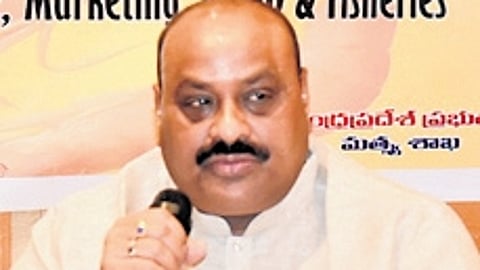

VIJAYAWADA: To counter the 26 per cent reciprocal tariff imposed by Donald Trump’s administration on Andhra Pradesh’s aquaculture exports to the US, Minister for Animal Husbandry and Fisheries K Atchannaidu announced the formation of National Prawns Coordination Committee (NPCC) at an aquaculture stakeholders meeting in Vijayawada on Monday.
Modelled on the lines of National Egg Coordination Committee (NECC), the NPCC aims to unite aqua farmers, seed and feed traders, and exporters to address the crisis, and boost domestic shrimp consumption.
Atchannaidu emphasised that the NPCC could turn the export challenge into an opportunity by enhancing coordination across the sector’s four pillars—farmers, seed suppliers, feed traders, and exporters.
“We’re taking all possible measures to prevent the industry’s collapse,” he assured, urging stakeholders to remain hopeful. The government is also exploring this regulatory body to reduce reliance on foreign markets and stabilise the industry.
MLA Vegesana Narendra Varma Raju proposed that hatcheries, processors, and exporters create a fund to support the NPCC, predicting a stronger future through collective action.
To ease financial strain, the State introduced the supply of subsidised electricity at Rs 1.50 per unit for aqua farmers, regardless of zoning, upon registration. Plans to negotiate with feed manufacturers to lower input costs and hold district-level farmer conventions are also underway.
With the US tariff threatening exports, the government is prioritising domestic consumption. Deputy Assembly Speaker K Raghurama Krishnam Raju, who co-chaired the meeting, called for campaigns highlighting shrimp’s health benefits—like high protein and good cholesterol—to drive demand.
He suggested including shrimp in army menu, a proposal he intends to raise with the Centre. MLA Gadde Rammohan Rao echoed this, noting that consumer education could reduce export dependency, while Special Chief Secretary of Fisheries Budithi Rajasekhar described domestic consumption as a “shield against external pressures.”
The tariff crisis has cost the sector hundreds of crores in just four days, alarming farmers and exporters.
During the meeting, exporters agreed to purchase shrimp from aqua farmers, and they will announce the price once they finalise it, so farmers are not taken advantage of by middlemen. Atchannaidu confirmed that a letter has been sent to the Centre for aid, with ongoing discussions involving exporters and State associations.
The fisheries sector, vital to Andhra Pradesh’s economy, remains a priority, he said.
Atchannaidu highlighted the poultry sector’s success as inspiration, stating, “By boosting local shrimp consumption, we can offset export losses and build a sustainable future.”